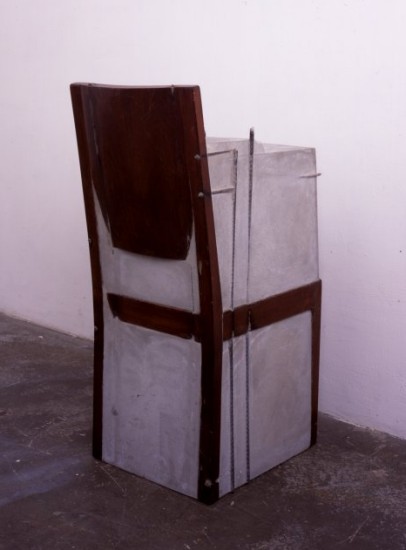The Unthought Known
dal 6/3/2002 al 13/4/2002
Segnalato da
6/3/2002
The Unthought Known
White Cube, London
White Cube² is pleased to present The Unthought Known, a group exhibition that brings together the work of internationally acclaimed artists. All of the artists selected in this exhibition make work that, albeit in very different ways, deal with issues of memory and the trace of experience, whether it be historical, political, religious, domestic or sexual. In many cases, these histories are traumatic, making porous the boundary between personal and shared histories.

Preview Thursday 7th March 6-8pm
White Cube is pleased to present The Unthought Known, a group exhibition that brings together the
work of internationally acclaimed artists, Miroslaw Balka (Poland), Robert Gober (USA), Clay Ketter
(USA/Sweden), Doris Salcedo (Colombia) and Luc Tuymans (Belgium). The title for the show derives
from a term coined by the psychoanalyst Christopher Bollas in his book, 'The Shadow of the Object:
Psychoanalysis of the Unthought Known', which describes how an individual's life, or by extension a
culture, can be organised around a past event or experience that is so enigmatic or traumatic that it
is repressed, denied and relegated to the depths of the unconscious. It is therefore 'unthought' -
unacknowledged on a conscious level - yet is still in a deep way 'known' and formative.
All of the artists selected in this exhibition make work that, albeit in very different ways, deal with
issues of memory and the trace of experience, whether it be historical, political, religious, domestic
or sexual. In many cases, these histories are traumatic, making porous the boundary between
personal and shared histories.
Miroslaw Balka's works are informed by his own Catholic upbringing as well as the historical
memory and experience of Poland's fractured political history. For this show, Balka will present
three sculptural works including an endless column of used soap, threaded onto a steel cord
suspended from the gallery ceiling, and a carpet filled with salt. Doris Salcedo reworks familiar
objects to bear witness to the recent violent political history of Colombia. Often her sculptures are
based on a domestic piece of furniture that is then filled with materials such as concrete and glass;
sculptures that are invested with a potent charge and aura of pain.
Robert Gober has described how an image might haunt him and how he lets it sit and breed in his
mind. One such image is the disembodied leg, a composite image formed from various recalled
experiences, such as seeing the cropped legs of men on an aeroplane or glimpsed beneath the
toilet door in the men's room. The Unthought Known will include 'Untitled', 1993-4, a floor-based
corner sculpture consisting of a pair of splayed, truncated legs of sexual ambiguity giving birth to a
single male leg, replete with body hair, a sock and a shoe. The work is perversely denatured and
psychologically disquieting.
Luc Tuymans makes groups of paintings that are charged by particular subjects, usually related to
European history whether it is the holocaust, or the bloody history of Belgian colonialism in the
Congo. His paintings often depict bleached out images that seem to barely surface, resolving and
dissolving before the eye, images that are as much felt as seen. This exhibition will present two
works by Tuymans - a triptych entitled 'Ice I', 'Ice II' and Ice III' and a work called 'Mrs'. The Ice
triptych is painted in a muted, flat palette of colours and depicts familiar objects - a door handle, a
glove and a tray, fragmented images that through their dislocation and isolation, seem muted
carriers of something unspeakable.
Clay Ketter makes paintings and sculptures which explore the domestic traces left from removed
cabinets and built-in furniture. His objects are impeccably executed in a glossy, muted palette,
employing the language of abstraction to interrogate the modernist grid, while at the same time
investing it with the trace of a human presence and of a function now lost.
The artists in this exhibition share an interest in making strange or reworking familiar, everyday
objects and materials that function as vestiges and carriers of memory. In some cases, selected
objects are cast in other materials and it is often through their trace or imprint that the memories are
enabled to surface perhaps allowing a discharge or conversion of the experience. Whilst initially the
artists included in the show appear to share a sensibility or mood, each particular contribution will
reveal the very distinct undercurrents and varied landscapes that reflect the particular concerns and
highly specific contexts from which they emerge.
A fully illustrated catalogue with an essay by Daniel Birnbaum will be available.
For further information please contact Alexandra Bradley or Honey Luard on 020 7930 5373.
White Cube², 48 Hoxton Square, London N1 6PB



